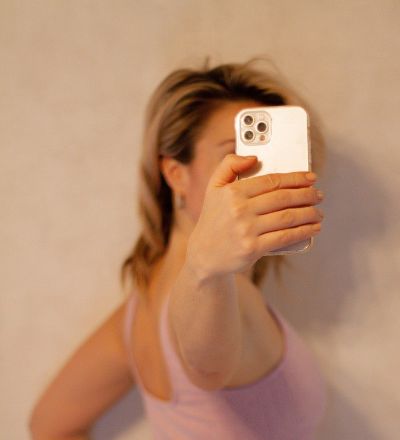Beating BDD Story
 Beating BDD Story – Excerpt from The BDD Family book by Dr. Eva Fisher
Beating BDD Story – Excerpt from The BDD Family book by Dr. Eva Fisher
I have been suffering from BDD for as long as I could think of, I’m now 27 and have lost alot of my 20’s being isolated, housebound, and depressed. Thanks to the help of professionals and my own initiative, I’ve managed to minimize the presence of its manifestation these days. I’m always aware that BDD is a “mode” I could always slip back into and manage my attention and focus to prevent this from happening.
If any of you were to see me, I know you’d point to flaws in me physically. I’m not the best weight because of my medication either but I’m willing to take the punches of weight gain for mental clarity any day.
Back at University
In the early days when I was hospitalized and put into a BDD group, pretty much the whole group used to analyze me and put me down physically!… it took me a long time to realize their opinion didn’t matter… What did matter for me in the end was the firm core belief that my sum of worth as a Human being is so much more than what BDD told me it was.
These days I don’t think about myself as an aesthetic object or use comparative and hierarchical analyses anymore to value myself on. I just let it be, call me ugly, call me handsome, or even the elephant man, I know my own worth and know that its more than my mere exterior.
I’m back at university and this has helped my BDD about 500%. Being around people who are normal in the sense they don’t judge you on your appearance or don’t consider appearance important has helped lots. When I was hospitalized, it was about 50 times worse because everyone in there who had BDD would scrutinize you head to toe. And because you knew they were doing it, you’d ruminate and thus would unravel the disorder at its worst.
I’m still not 100% free of challenges. I consider most women my age group to be daunting and have been single for 3 years. I don’t have many friends due to the fact I’m a different age group to my peers at Uni, and the isolation gets me down. But it’s not half as bad as what BDD puts you through.
My Life Post Body Dysmorphic Disorder
The reason I wrote here was to create a perception for you all on what it’s like “post” BDD. I know alot of you won’t believe it’s possible to reach this level, but I urge you to keep pushing and pushing… I want you to know it’s possible. I’ve done stupid things, lost friends, family and partners cus of my BDD fueled behaviour.
I know what it’s like, but I urge you to keep going. You will get there and when you do you’ll feel complete. That feeling of completeness is so much more than anything you might be looking for.
Regardless of whatever ways we may put ourselves down by, we exist on this planet, and we are all trying to be happy in this life. I really really hope that one day we can all come out of this fully recovered and look back on it as a thing of the past…
My New Thought Processes
My new outlook/thought processes come from long practice of exposure, attention refocus, and the resultant improved metacognition that comes with it. Metacognition is a big theme for us. It basically means how you think about you’re thinking. I notice my thoughts, and then decide whether they are helpful/maximize my chances of being happy/well, and then choose whether to buy into them or not.
100% of the time BDD is wrong/unhelpful! Believe me, it’ll try and tell you that it’s right and you’re wrong. I firmly assure you, we are all human and we all deserve happiness, we all deserve good mental health and not what BDD puts us through.
For example if I walk down the street and see a beautiful girl, and then think she thinks I’m ugly, I notice and literally “watch” the thought. Then I focus on something that is sensory (like the feel of wind on my face or the feeling of the footpath on my feet) and this helps me engage with the outside world to such an extent that the thought does not follow through with an irrational emotion (usually would be fear/anxiety for me).
On top of this I do attention training every morning and this helps me get into the correct mindset of functioning. I still avoid some situations and still find them hard, but remember, the less you avoid the less BDD/problems you have in general.
How to Beat BDD – Advice from My Therapist
1) Do attention training every morning (designed by Adrian Wells from the University of Manchester)
2) Regular exposure and use the attention refocus and metacognitive ability to fight the BDD during exposure.
3) Spot your avoidances and target them immediately,
4) Positive data logging (this really helps me) with a therapist.
Find out your core beliefs that cause your BDD. These core beliefs are split into 3 categories: self, world, and others ( e.g. mine was that I was defective/ugly for self, the world is a hostile place for world, and other people are out to taunt me as others). Then what you do is every day for each belief, write down a piece of evidence that disputes it that happened during your exposure. Try really hard to find at least the tiniest bit of evidence and you’ll help yourself immensely.
5) Trauma work.
Most people with BDD believe it or not have had a history of social anxiety and trauma (myself included). Addressing these traumas with your therapist using specific techniques they give you can help massively. At the root of BDD is trauma, and if the trauma is not resolved by the brain, it will always resurface in one way or another. Most of us think we’re ugly because we’ve been traumatized into thinking so. So, by treating BDD like a post trauma occurrence, we can resolve it and dampen it loads by emotionally resolving and coming to terms with what happened in our childhood/early life.
For example, I was bullied massively about my appearance from the ages of 0-12. Then puberty hit and hormones kicked in and I found myself dating and being dumped by girls one after another! This didn’t help either! especially when my so called best mates ran off with the women I was dating. But what I’ve done is address these traumas with a skilled therapist, and worked out that anyone in my position would end up thinking they’re ugly (I’m even hedging my bets that Brad Pitt would consider himself to be not very attractive if he was bullied and traumatized like I was ).
Remember BDD is a multifaceted problem, but at its root lies our trauma. Addressing these traumas will help you massively.
More excerpts from BDD Forum Members are available in The BDD Family book by Dr. Eva Fisher. Please contact Dr. Eva with any questions about her recovery from BDD and her book.




Thank you for your testimony. It resonates clearly with me.
Steve J.